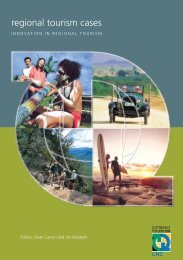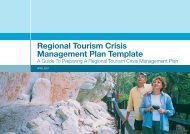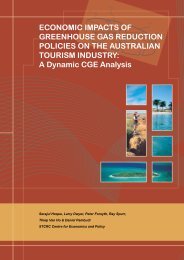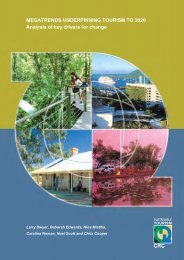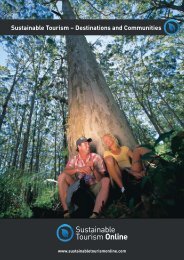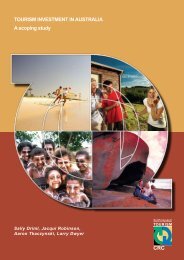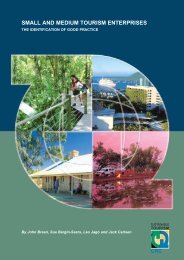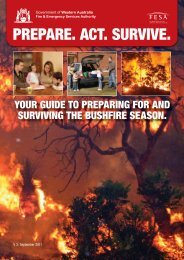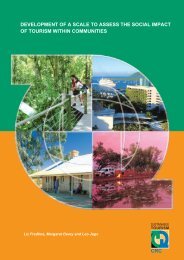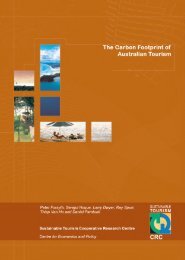Tourism Risk Management - Sustainable Tourism Online
Tourism Risk Management - Sustainable Tourism Online
Tourism Risk Management - Sustainable Tourism Online
Create successful ePaper yourself
Turn your PDF publications into a flip-book with our unique Google optimized e-Paper software.
• Be honest and ethical in promotion<br />
Just as in communication, building and maintaining credibility is fundamental in tourism promotion.<br />
Avoid overselling or misrepresenting your destination and be ethical in the choice of promotional<br />
content, or you could create your own crisis. The Bahamas, for example, was heavily criticized in the<br />
international media for using photos in its advertising that were taken in Hawaii, the Seychelles and<br />
Florida.<br />
• Set aside budget reserves for emergencies<br />
Recuperating from a crisis requires money for additional promotion and communication activities. A<br />
prudent destination management organization will set aside an emergency fund for use in a crisis.<br />
Establish efficient methods of accessing these funds when required.<br />
• Stay out of the Travel Advisory War<br />
Ideally, Government Travel Advisories should be issued in accordance with Article 6 of UNWTO’s<br />
Global Code of Ethics for <strong>Tourism</strong>, which states:<br />
“...governments should issue such information without prejudicing in an unjustified or exaggerated<br />
manner the tourism industry of host countries and the interests of their own operators”.<br />
The purpose of travel advisories is to ensure that travellers are well-informed and well-prepared for<br />
travel overseas, and to help them avoid dangers and difficulties. They provide up-to-date information<br />
about the security environment in a particular country, including possible terrorist threats or problems<br />
with law and order. They also provide advice on a range of practical issues such as visa<br />
requirements, health and medical issues, cultural or religious differences, etc. Travel advisories<br />
should be reviewed and updated as appropriate.<br />
• Improve communication of security issues with visitors<br />
Make visitor safety and emergency information available on your destination website. Some of the<br />
most useful information to include is: emergency telephone numbers; exchange rates; design of<br />
banknotes; common rules of behaviour; places to avoid travelling; safe places to leave luggage;<br />
average prices of common purchases; the need to report crimes before a visitor returns home; and<br />
the importance of keeping photocopies of travel documents. The <strong>Tourism</strong> Authority of Thailand (TAT)<br />
website, for example, includes information on tough laws aimed at ending child prostitution and urges<br />
visitors to report incidents.<br />
• Encourage visitors to learn food safety practices<br />
The World Health Organization has prepared an excellent booklet of advice called “Safe Food for<br />
Travellers”. Adapt this information on how to avoid illness while travelling for use in promotional<br />
material, especially on the destination website or provide a link to the booklet on the WHO website:<br />
www.who.int/fsf/Documents/brochure/travellers.PDF.<br />
C) Reviewing security systems<br />
• Maintain a working relationship with other government agencies responsible for safety<br />
and security<br />
Decisions made by government agencies such as; police, emergency services, health, consumer<br />
affairs, judiciary, foreign affairs, and civil defence have a great influence on how a crisis involving<br />
visitors is managed. Start a Safety and Security Working Group to meet regularly to discuss tourism<br />
issues. In South Africa, for example, the <strong>Tourism</strong> Safety Task Group is made up of the Department of<br />
Environmental Affairs and <strong>Tourism</strong>, the national police, the tourism board (SATOUR), the <strong>Tourism</strong><br />
Business Council, the Department of Foreign Affairs and nine provincial tourism departments (see<br />
Case Study in Chapter 3).<br />
<strong>Tourism</strong> <strong>Risk</strong> <strong>Management</strong> – An Authoritative Guide to Managing Crises in <strong>Tourism</strong> 75



